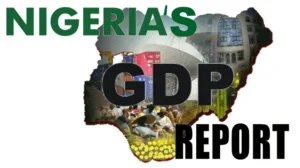CONTENTS.
-
MONETARY POLICY RATE.
-
FISCAL POLICY.
-
GROSS DOMESTIC PRODUCT
-
FINANCIAL LITERACY.
MONETARY POLICY RATE.

MPR Hiked for the 3rd Consecutive Time by the CBN.
Following a two-day meeting, on the 20th and 21st of May 2024, the Central Bank of Nigeria’s Monetary Policy Committee (MPC) of the Central Bank of Nigeria (CBN) has decided to raise the benchmark interest rate, known as the Monetary Policy Rate (MPR), by 150 basis points to 26.25 per cent from 24.75 per cent to rein in the country’s soaring inflation levels pegged at 33.69% in April 2024.
The decision aims to address inflation by tightening monetary policy. However, some experts and business leaders have expressed concerns that this move could negatively impact businesses, borrowers, and overall economic growth.
The CBN governor has emphasized the need to maintain a contractionary policy stance to combat inflation and achieve price stability. The committee also discussed the factors contributing to inflation, including the rising cost of transportation for farm produce, infrastructure-related constraints, security challenges in food-producing areas, and the impact of exchange rates on imported food items.
Additionally, the committee noted the recent volatility in the foreign exchange market and urged the CBN to focus on increasing reserves. The committee also commended the recent approval of licenses for international Money Transfer operators and emphasized the need for continued regulatory oversight to ensure the stability of the banking system.
The CBN governor addressed concerns about inflation and the recent decisions related to cybersecurity levy and fintech regulations, emphasizing the importance of maintaining a safe and secure financial platform for Nigerians.
Furthermore, the governor discussed the ongoing recapitalization of the banking industry and its importance for strengthening the sector.
GROSS DOMESTIC PRODUCT.

2.98% Decline in Nigerian’s GDP in Q1 2024
Nigeria’s GDP growth declined to 2.98% from 3.46% in Q4 2023, according to the latest report from the National Bureau of Statistics released on May 24, 2024.
However, the GDP growth rate in the current quarter surpasses the 2.31% figure recorded in the same quarter of 2023.
The first quarter of 2024 saw robust growth in the services sector, which expanded by 4.32% and accounted for 58.04% of the total GDP. Additionally, the agriculture sector experienced a modest growth of 0.18%, marking a significant improvement from the -0.90% decline observed in the first quarter of 2023.
The industry sector saw a substantial growth of 2.19%, a significant increase from the 0.31% growth observed in the same period last year. Notably, the Services sector made a greater contribution to the overall GDP in the first quarter of 2024 compared to the corresponding quarter of 2023.
The report clearly states that the aggregate GDP for the quarter under review amounted to N58,855,142.27 million in nominal terms.
The performance in the first quarter of 2023 surpassed expectations, with an aggregate GDP of N51,242,151.21 million, reflecting a substantial year-on-year nominal growth of 14.86%. For better clarity, it’s important to note that the Nigerian economy is distinctly categorized into the oil and non-oil sectors.
GDP growth in the oil sector.
In Q1 2024, the oil sector experienced a substantial growth rate of 13.77% on a quarter-on-quarter basis. Its contribution to the total real GDP rose to 6.38% from 6.21% in the corresponding period of 2023 and 4.70% in the previous quarter. However, this growth decreased by 6.41 percentage points from Q4 2023, which was 12.11
In Q1 2024, the oil sector experienced a robust growth rate of 13.77% on a quarter-on-quarter basis. Notably, the sector’s contribution to the total real GDP increased to 6.38%, marking a significant rise from 6.21% in the same period of 2023 and 4.70% in the previous quarter.
GDP growth in the non-oil sector.
The non-oil sector unequivocally achieved a growth of 2.80% in real terms during Q1 2024. This growth rate surpassed the same quarter in 2023 by 0.02 percentage points, yet fell short by 0.28 percentage points compared to Q4 2023.
Key drivers in the first quarter of 2024 included Financial and Insurance (Financial Institutions), Information and Communication (Telecommunications), Agriculture (Crop Production), Trade, and Manufacturing (Food, Beverage, and Tobacco), all contributing to positive GDP growth.
In Q1 2024, the non-oil sector made a significant contribution of 93.62% to the nation’s GDP, showing a slight decline from the 93.79% recorded in Q1 2023 and the 95.30% recorded in Q4 2023.
FISCAL POLICY.

Suspension Of The Nigerian Cyber Security Levy.
The proposed ‘Cybersecurity Levy‘ intended to be imposed on transactions by the Central Bank of Nigeria (CBN) to raise funds for national campaigns has been temporarily suspended.
The CBN stated that the Levy was being withdrawn after the Federal Executive Council (FEC) decided to suspend it last week due to public outcry. If approved, the Levy would have directed 0.5% of a transaction to the Nigerian Cybersecurity Council to fund campaigns and computer emergency readiness teams (CERTs).
Blurred Communication.
The proposed Levy was set to take effect in May 2024, with the CBN instructing various financial institutions to apply the Levy at the point of electronic transfer origination. However, this directive sparked a nationwide outcry from the Nigerian public, who expressed concerns about the increasing cost of banking transactions.
Media reports indicated that the Levy was withdrawn due to ambiguity, and the House of Representatives suggested that the CBN issue a clearer directive. There were also calls for the Levy to be capped at a maximum amount of N500 by the Nigerian Association of Chambers of Commerce, Industry, Mines, and Agriculture (NACCIMA). With over N600 trillion recorded in e-payments last year, a 0.5% cut would have a significant impact.
Dr. Abdulrazaq Fagge, an economics teacher at Yusuf Maitama University, highlighted the burden imposed on ordinary citizens by the proposed cybersecurity levy, citing the example of a significant deduction from a million naira transfer.
Funding the Cyber Policy and Strategy
Dr. Jimson Olufuye, a principal consultant at Kontemporary Konsulting and former chair of the Africa ICT Alliance, discussed the introduction of the Levy and its impact. The cybersecurity program was established in 2015 but lacked implementation until the current government took charge.
The need for funding to execute the cyber policy and strategy, establish a cybersecurity agency, and raise awareness prompted the introduction of the 0.5% levy. This levy will apply to specific transactions from GSM service providers, telecommunication companies, internet service providers, banks, financial institutions, insurance companies, and the Nigerian Stock Exchange.
Olufuye acknowledged that these entities generate substantial profits and are vulnerable to cyber threats in Nigeria. However, he also recognized the concerns raised by businesses regarding the charges, attributing the negative reaction to poor communication about the Levy.
Despite the initial backlash, Olufuye believes the Levy will resurface in a revised form. He emphasized the importance of effective communication and transparency in addressing public concerns about the use of funds collected through the Levy.
The unconventional approach to raising funds through the Levy underscores the need for improved communication and awareness efforts. Highlighting the potential benefits of a national cybersecurity program in enhancing the nation’s security could help to garner public support.
In conclusion, the Levy appears to be an additional financial burden on the public, indicating the necessity for clearer communication and engagement with stakeholders.
FINANCIAL LITERACY.

7 Money Management Tips Bases on Money Personalities.
Understanding your money personality can be a great starting point for effective money management. By recognizing your tendencies and attitudes towards money, you can develop personalized strategies for budgeting, saving, and investing. Whether you’re a spender, saver, risk-taker, or planner, tailoring your financial approach to align with your money personality can help you achieve greater success in managing your finances.
1. The Compulsive Saver:
Signs you might be a Compulsive Saver:
- You save money endlessly without a specific goal in mind.
- You believe that saving money is the key to feeling secure in life.
- You are very frugal and always seek the best deals.
Pitfalls:
Some Compulsive Savers may avoid spending money on activities that could bring them happiness and purpose, which might lead to a sense of regret in the long run.
Money advice:
- Strive for a balance between saving and enjoying life.
- Consider how you can use your savings to achieve your future goals.
2. The Compulsive Spender:
Signs you might be a Compulsive Spender:
- You tend to spend money on unnecessary things.
- You enjoy treating others and seek immediate gratification through spending.
- Emotional distress may lead to impulsive spending.
Pitfalls:
Compulsive Spenders may accumulate debt and struggle to control their spending, potentially leading to financial instability.
Money advice:
Creating a budget plan can provide a fresh perspective and help prioritize essential expenses and financial goals.
3. The Compulsive Moneymaker:
Signs you might be a Compulsive Moneymaker:
- You believe that earning more money is the key to happiness.
- You dedicate significant energy to increasing your wealth.
- Recognition and approval for financial success are important to you.
Pitfalls:
Compulsive Moneymakers may prioritize wealth over important relationships, risking personal happiness and fulfilment.
Money advice:
- Recognize that there is more to life than money.
- Consider using your wealth for meaningful purposes, such as helping others or creating memorable experiences.
4. The Indifferent-to-Money:
Signs you might be an Indifferent-to-Money:
- You rarely think about money and may feel averse to creating a budget.
- Some individuals believe that money is inherently bad or evil.
- You believe that money should not influence life’s important decisions.
Pitfalls:
While a modest approach to money can be healthy, being indifferent to financial matters can lead to irresponsibility and dependency on others.
Money advice:
Even if you are financially comfortable, staying informed about your finances can reduce future stress and uncertainty.
5. The Saver-Splurger:
Signs you might be a Saver-Splurger:
- You exhibit traits of both Savers and Spenders.
- You alternate between saving and impulsive spending.
Pitfalls:
The fluctuation between saving and splurging can lead to emotional and financial stress.
Money advice:
Before making significant purchases, consider the long-term impact on your financial goals and overall well-being.
6. The Gambler:
Signs you might be a Gambler:
- You share traits of Moneymakers and Spenders.
- The thrill of risk and potential rewards drives your financial decisions.
- Gambling may serve as a means to escape boredom.
Pitfalls:
Excessive risk-taking can lead to significant financial losses and may jeopardize long-term financial security.
Money advice:
Exercise introspection and prudence when taking financial risks, and prioritize stability and security in your decision-making.
7. The Worrier
Signs you might be a Worrier:
- Constant worry about potential financial loss, regardless of your current financial situation.
- Lack of confidence in your ability to achieve financial freedom.
- Obsessing over worst-case scenarios related to money.
Pitfalls:
Excessive worry can overshadow present happiness and cause unnecessary stress.
Money advice:
Seek positive and constructive financial conversations, and consider seeking support from a financial advisor or therapist to address and manage your financial concerns.
Contact us today for more insight in financial advisory, investment and loans.
SOURCES: centrumfinanceltd, SC Media UK (Dan Raymond), Thisdaylive.com, photo credit istock images, google images.
DISCLAIMER
This publication is produced by Centrum Finance Company Limited solely for the information of users who are expected to make their own investment decisions without undue reliance on any information or opinions contained herein. The opinions contained in the report should not be interpreted as an offer to sell, or a solicitation of any offer to buy any investment. Whilst every care has been taken in preparing this document, no responsibility or liability is accepted by any member of the Company for actions taken because of the information provided in this publication.

